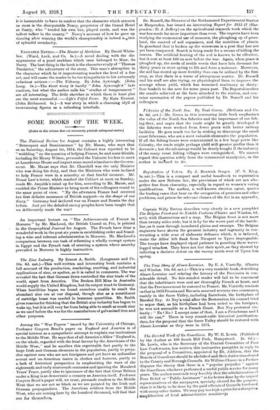Dr. Russell, the Director of the Rothamsted Experimental Station at
Harpenden, has issued an interesting Report for 1915-17 (Har- penden : D. J. Jeffery) on the agricultural research work which the war has made far more important than ever. The experts have been studying the economical use of manures, the ploughing up of grass- land, the control of soil organisms, and the nutrition of plants. In grassland that is broken up the wireworm is a pest that has not yet been conquered. Search is being made for a means of killing the insects. The artificial heating of the soil is known to be effective, but it cost at least £40 an acre before the war. Again, when grass is ploughed up, the seeds of arable weeds that have lain dormant for thirty years or more spring to life and form a nuisance. Moreover, the soil has stored up more fertility than can be utilized by the first crop, so that there is a waste of nitrogenous matter. Dr. Russell and his staff are also trying, on physiological lines, to improve the average wheat yield, which has remained stationary at thirty- four bushels to the acre for some years past. The Report describes the results achieved at the farm attached to the station, and con- tains summaries of the papers published by Dr. Russell and his colleagues.


































 Previous page
Previous page